Marine Electronics Offshore Technical Service Engineer
Frederick AryeeQuaye Aryee is a Marine Electronics Technical Service Engineer and Radio Surveyor for the International Maritime Group based out of the UAE. Frederick has experience with different types of engineering. He is married with two children and is from Ghana.
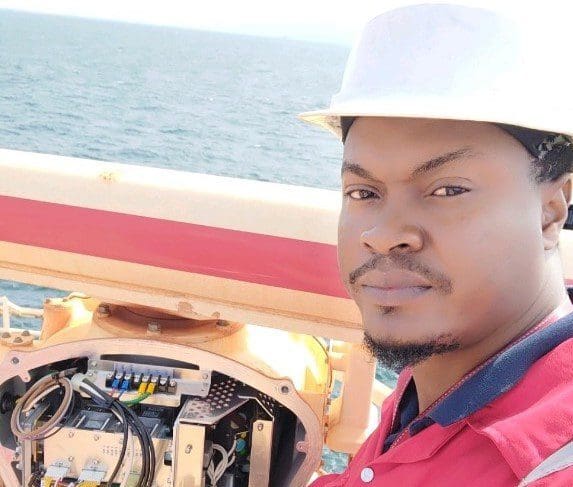

Background and path to engineering
Could you give a brief description of your background and what led you to study and work in engineering?
I started by studying electronics and telecommunication from the national vocational institute. Then I did my City and Guilds of London part 2 in telecommunications and electronics. At that time ICT was the new course that was coming up. My research showed that jobs in that field paid well, and so I studied for a diploma in computer science. I continued with CompTIA A+ and CompTIA Network+ certification. I also studied computer software programming basics in different languages. However, I didn’t do any advanced courses in programming.
I didn’t just study engineering, as well I studied German language basics.
At the same time, I was working on freelance amplification projects building my own power amplifier.
Were you interested in science and engineering when you were a child?
When I was a child, I was more into destroying or to put it another way curious about how things operate. So, I dismantled my dad’s omega automatic watch to see how it worked without batteries. Then I moved onto his radio and television. After that, he said to me: “I think you will be the type of child for electronic engineering.” From then on, he got me all the things I needed to learn and understand electronics and computing.
Did you like fixing things as a child?
Yes, all the time.
Was there anyone in your family who guided you towards engineering?
My dad was my number one guide and also a teacher and mentor the late, Mr Philemon Tettey.
Has there been a particular person who has inspired you at college or at work, or in the wider world?
As well as my dad and Mr Philemon Tettey, Mr David Zu, and Mr Ansah who was my electronics teacher in college.
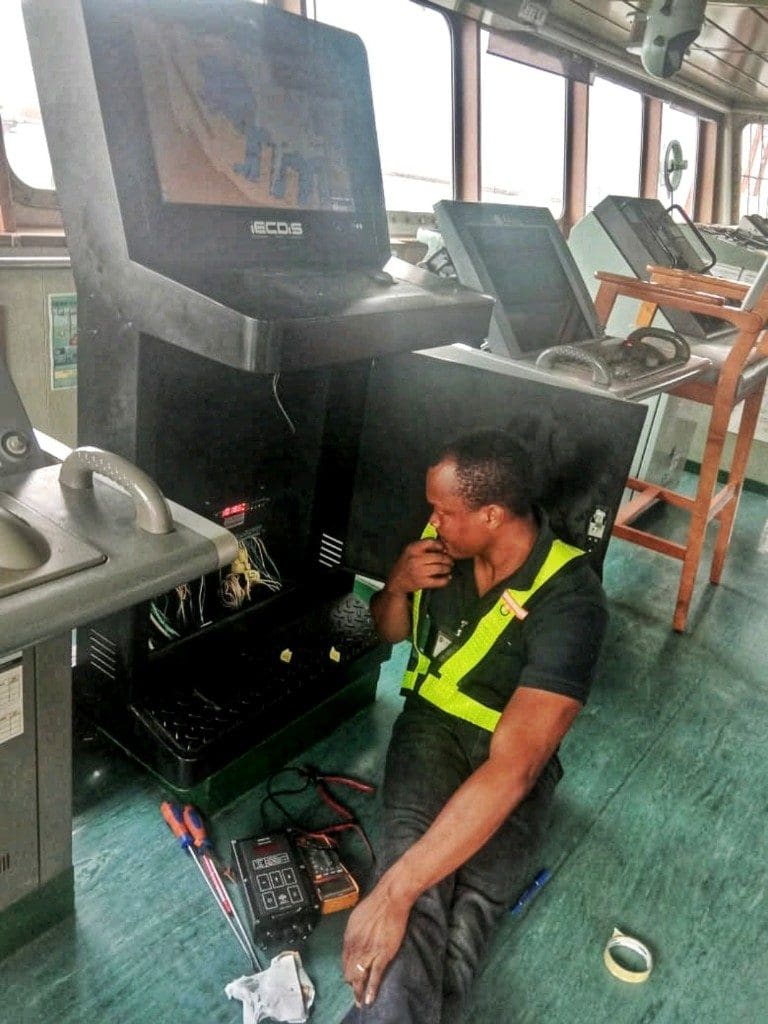

Transferable skills in field engineering
You have worked as a Network Technician and System Analyst and also with security. What are the transferable skills you took with you to other roles?
In my current field you need to have in depth networking knowledge as well as computing general knowledge and some security system/CCTV experience. With this you are able to understand the system and are able to install these systems onboard vessels.
The specific skills I gained were:
SMD (surface-mounted device) soldering,
troubleshooting,
networking,
computer hardware, and
satellite system configuration.
Technical service engineer/Radio surveyor/Navcom service engineer
What’s your typical day like?
In my role, when I get on board a vessel, the first things I do is view the deck AFT to BOW to see the health of the vessel, if it’s rusted or in good condition.
Once I am on board, I do the following.
Firstly, I log in my name and time and show my identity card and let the on-duty person know who I am and what I am on board to do. Then they send me to the captain on the bridge.
After that I can begin my job.
Radio survey
If it is a radio survey, I ask for the previous class documents from the last survey. I need these to inspect what’s on the documents and if it the same equipment has been installed on the vessel. I also check the health of all the navigation equipment according to the class procedure for inspection.
Navcom
As a Navcom service engineer I follow the same process when I get on board but this time when I meet the captain, I introduce myself and ask about the issues they are currently facing prior to the specific equipment that was reported.
Then I begin my check and troubleshoot the fault. Once that is completed, I report to the captain to see what else I can do. If I can fix it the same day I do it immediately.
If I can’t I write a recommendation in my service report so that the spare part(s) can be acquired and delivered to the next port of call for me to fix. When that happens, I can write my final service report with all the details of what I did on that equipment.
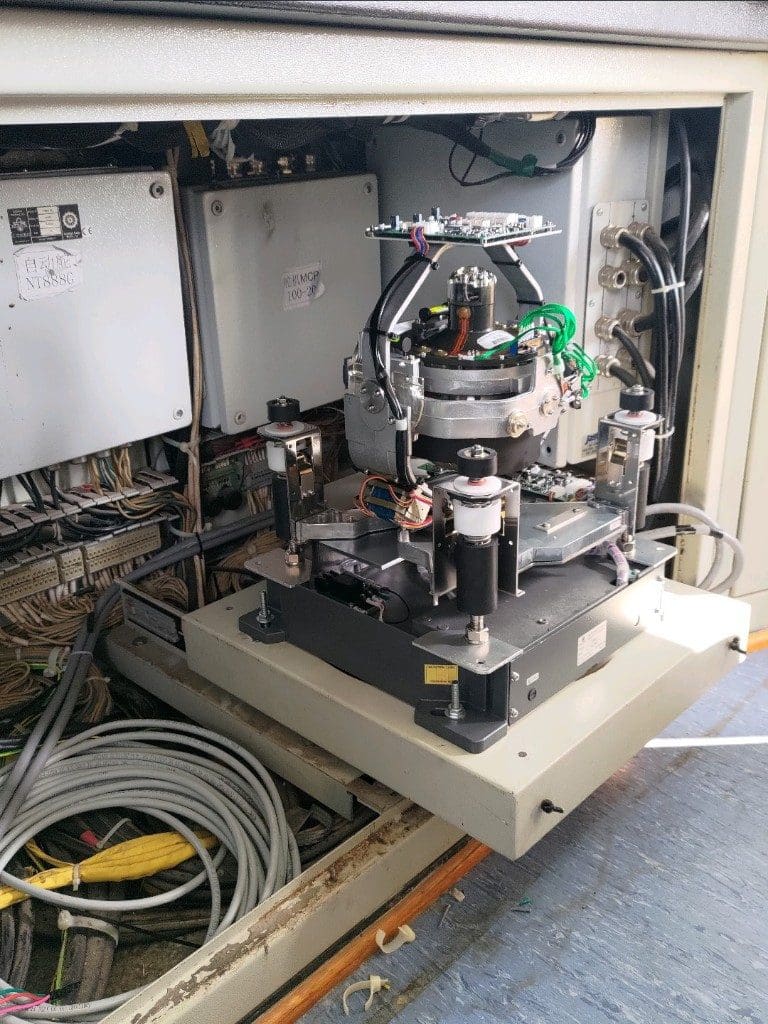

Work patterns and types
Do you work on a shift basis?
No in my field it’s like in the fire service when you can be called at any time. Whatever the time, you have to wake up and go as most jobs are the emergency kind of jobs. On a few occasions, you have time to prepare and can then leave for the job in a day or two.
Do you have to be on call at night or at weekends?
Yes, most of the time.
What type of engineering do you do on the ship?
I work on navigational and communication equipment.
How do you cope with the lack of space and privacy?
It’s very difficult but when I don’t have a job, I use that time to spend as much time as possible with my family.
How do you keep up to date with all the international codes and standards?
Yes, in this field you are always doing one course or the other to update and get the newest regulations.
Most challenging part of the job
What do you find most challenging when you are working?
The most challenging part of the job is to run a cable from the bridge to the tip of the monkey island or to run a cable from the engine room to the bridge.
What has been your most challenging job so far?
Doing a retrofit of VDR or of an S&X BAND RADAR from different manufactures and having to change everything completely in order to install the new one. It takes about 2 weeks with the help of the crew and longer if it’s me alone. There will be fabrication of new mounting plates for the new scanners and also at the bridge you will need fabrication for the base of the radar stand. So, it takes time and then there is termination and configuration, testing, and commissioning.
Is your role ever uncomfortable because of heat, cramped spaces, bad lighting etc?
Yes, I experience all of the above and I am very uncomfortable when I meet these situations.
What is more difficult when at sea compared to on land?
When you don’t have internet connection and the whole vessel is radio silent for 2 weeks. This is because the captain turned off the satellite system to avoid been tracked by the mother company in the middle of the sea.
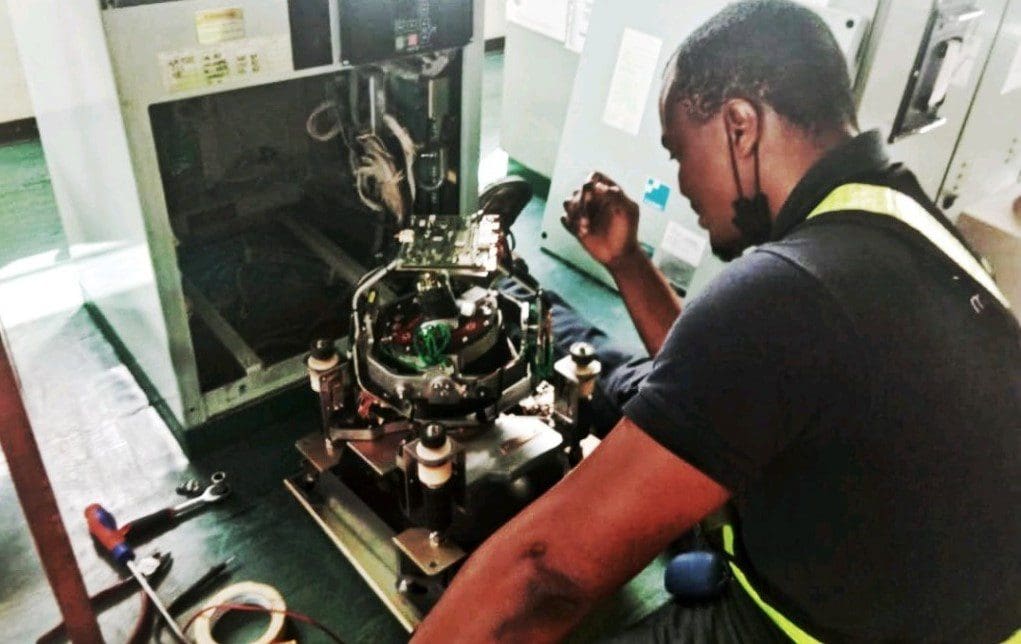

Advice for new engineers considering working offshore
What advice would you give to new Navcom engineers/radio surveyor’s:
In their first week?
All I can say is first humble yourself as you don’t know anything. Then even when you do know something, still humble yourself as if you don’t know, and that way you will learn more from people.
In their first month?
Ask questions and be curious to learn more from senior engineers.
In their first year?
Be ready to be asked to do the strangest jobs which are not in your job description and learn a bit from each of them.
Apart from a strong technical background, what are the three most important skills to have?
Know how to listen to people and figure things while you talk just from the words that are spoken.
Respect your colleagues and treat people with love.
Even when you do know something let someone show you their method to solve the same issue and so learn from another different angle.
How important are people and communication skills?
90 per cent important
How important is ongoing training?
100 per cent important.
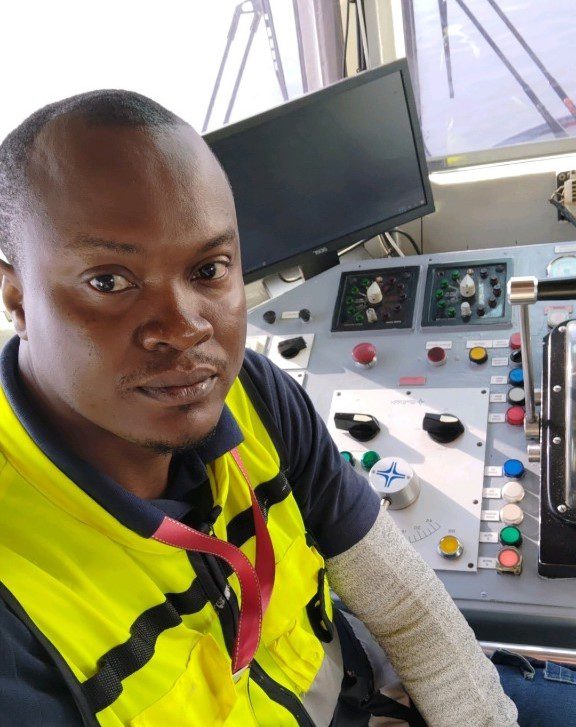

Working internationally
How has working with different nationalities helped you in the work you do?
To know how to be a better human being and to understand people much better.
Has it also enriched your life in other ways?
Yes, very much so.
Family and life work balance as a field engineer
As a father, how do you keep a good life work balance even when offshore?
I don’t stay too long offshore, so I get to see my family if not every two weeks, then every three months. However, it’s another issue I worry about and look at how best to handle this: children need to have the father figure in the family and experience the love of their father.
What advice would you give to other engineers on balancing work and family?
Hmmm, I would say find a job that is stationed in your country so that you can at least make some good time for your family.
Further information about Frederick’s career
Frederick has trained with Raytheon Anschutz in Germany on these courses:
in standard 22 gyro compass with distribution unit and operator unit, advanced steering systems FU Amplifier,
CAN bus distribution,
alarm signal Unit,
Feedback unit,
Tillers and handwheel,
NSC radar /synapsis radar.
He has also trained with NETWAVE Netherlands currently owned by Seas of Solutions on their:
RUTTER G2,
G3 VDR full installation and retrofitting and
NETWAVE NW4000 AND NW6000 while he was working with HANVIL MARITIME LTD.
While he was working with EMIZON SECURITY SYSTEMS he had training on:
Honeywell access controls,
HIKVISON CCTV systems,
ZKTECO where he got a lot of experience in that field as a security systems technician.
Frederick has also trained with KVH online with this list of courses:
TRACPHONE V3,
TRACEPHONE V7,
TRACEPHONE V11,
TRACEVISON TV5, TV6 and TV8.
He did his GOC (General Operator Certificate) in Mumbai India at Saint Xavier’s college as a GMDSS operator as well as for his GMDSS radio inspector or surveyor job.
He did his medicals and training for his seaman book while working in Master Systems llc.
In his current company International Maritime Group, he trained on a refresher course from SEA OF SOLUTIONS VDR RUTTER G3, retrofitting and NETWAVE NW6000. He has also trained with JRC Singapore on the GMDSS JSS-2150 MF/HF, JFE-400/700 ECHOSOUNDER, JHS-800S, JLN-400/700 DOPPLERLOG. There will be more courses coming up soon to keep him updated with new technology.
Frederick says that he is very grateful to all the companies for the knowledge and investment made in him to become who he is today.
Further reading
Olufemi O Makinde Marine Coating Inspector in West Africa
Simon Fernandez de la Mata, Marine Field Service Manager in Spain


Responses